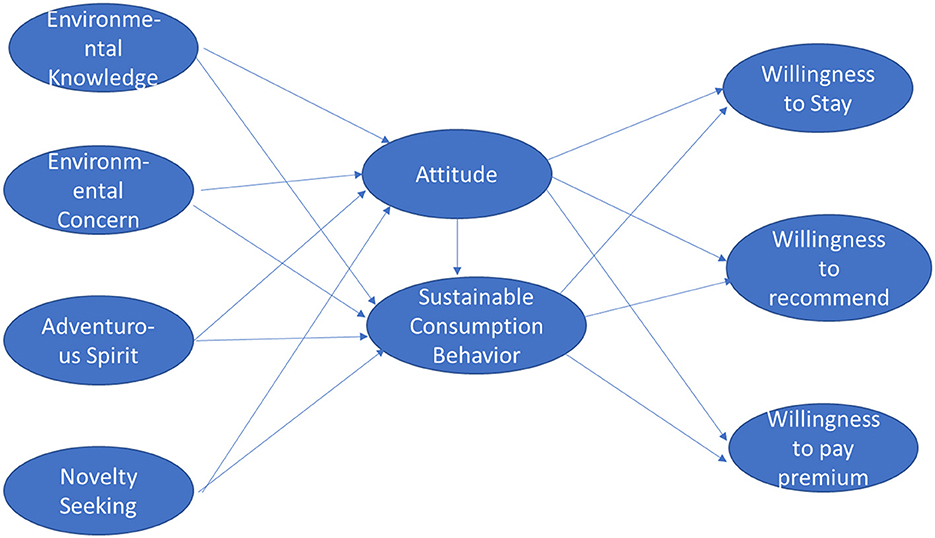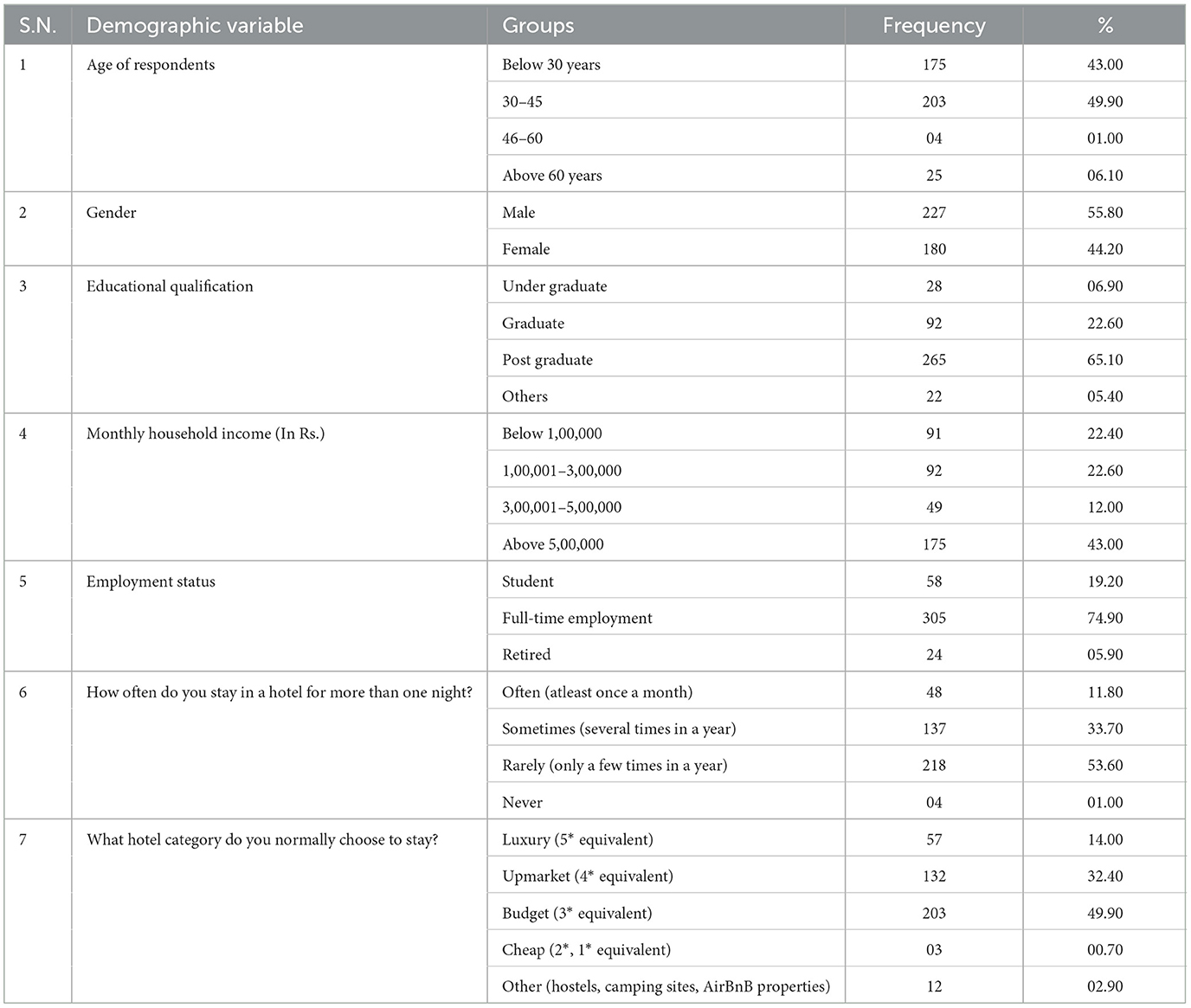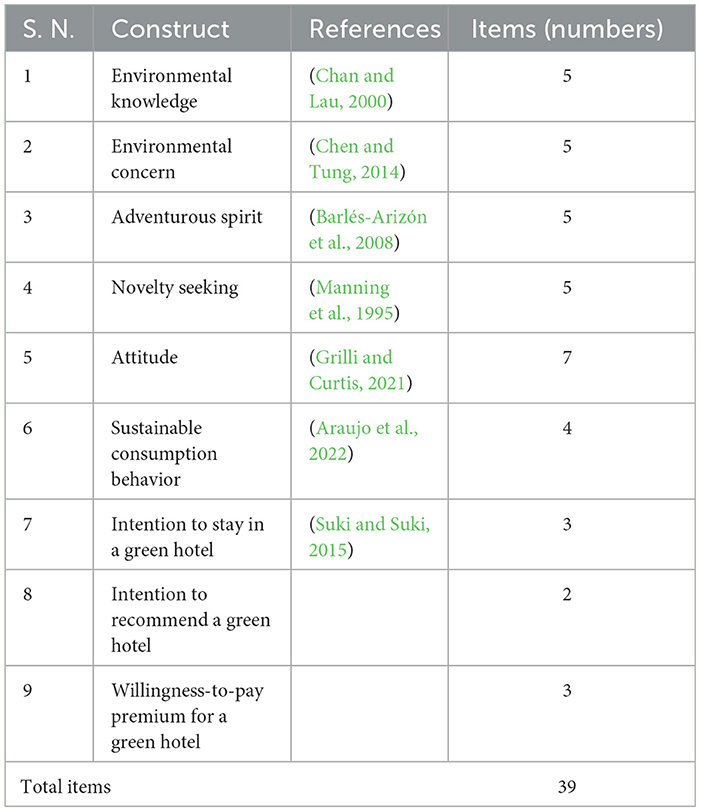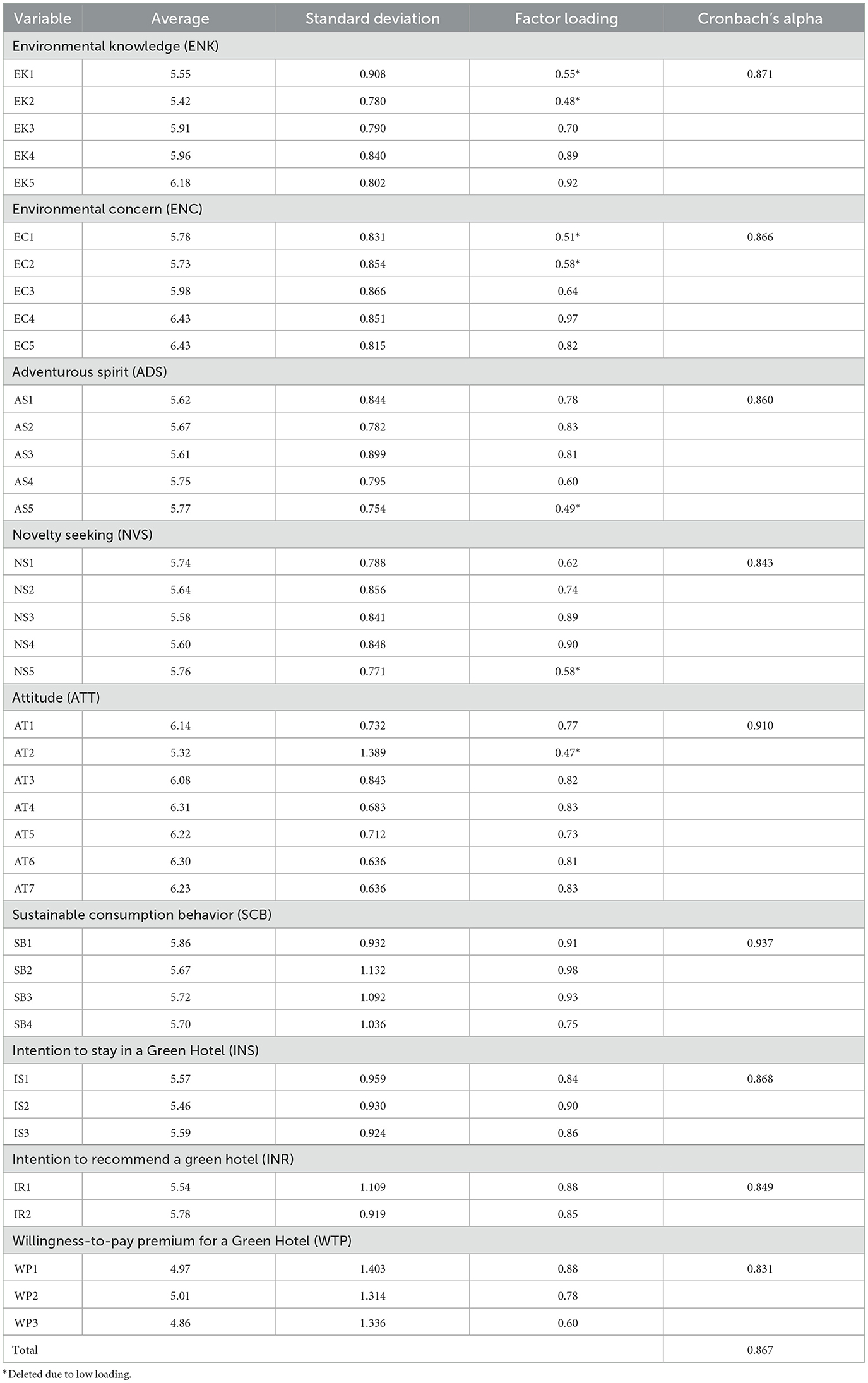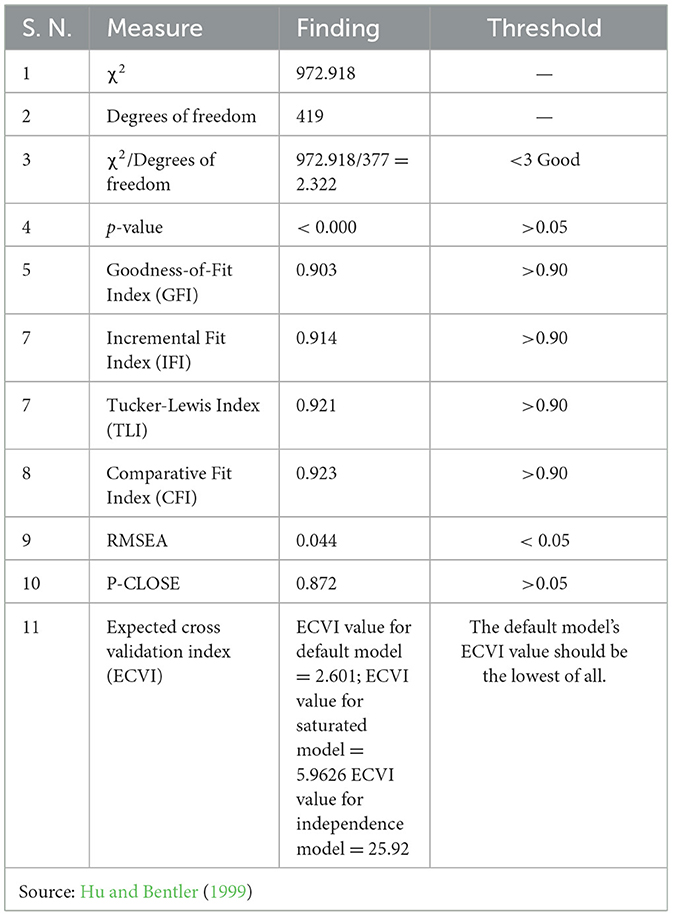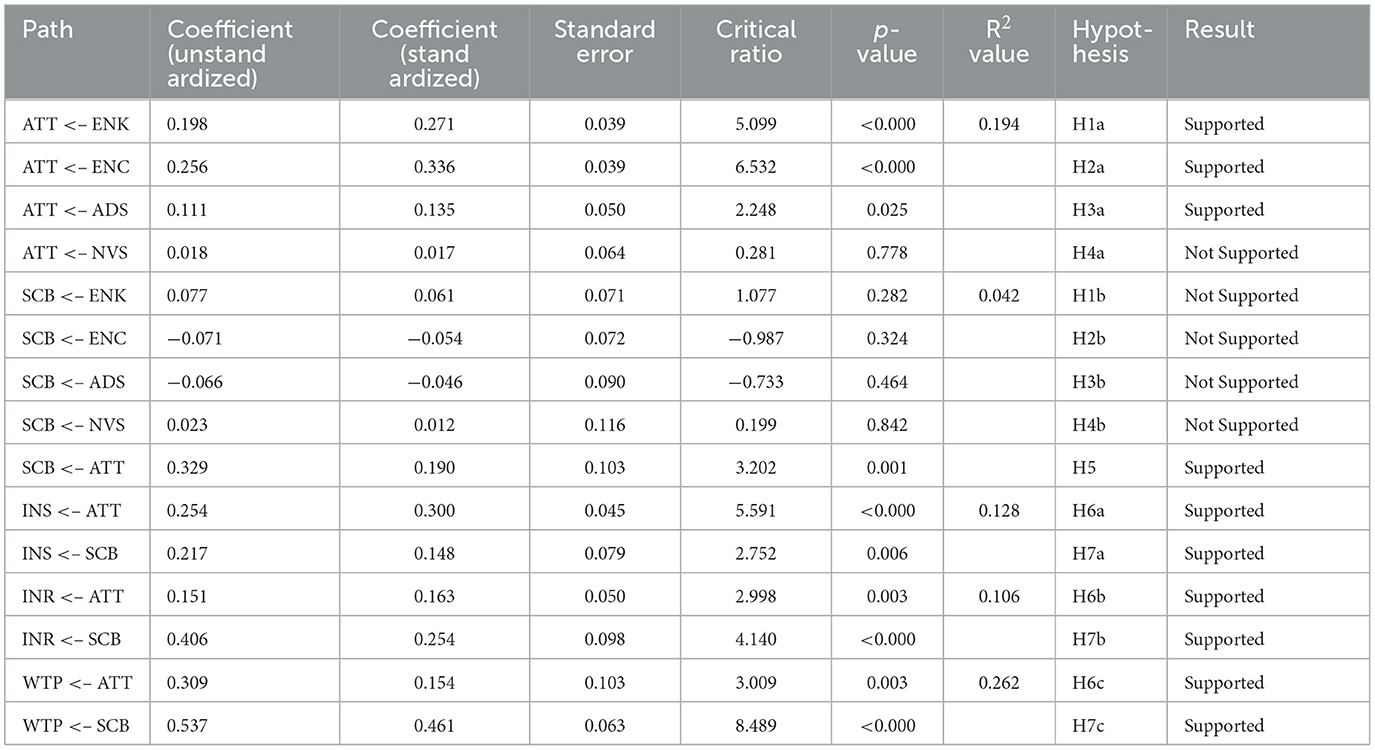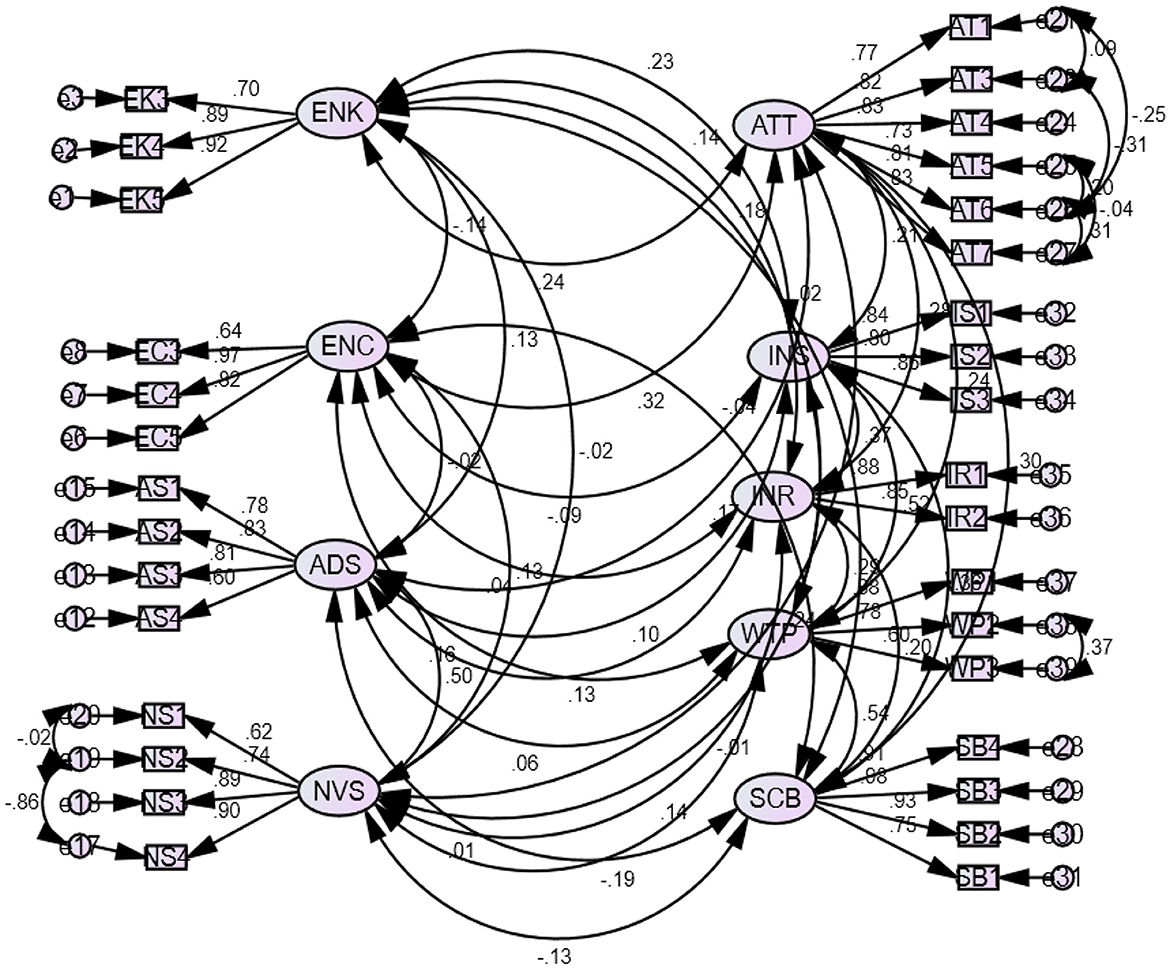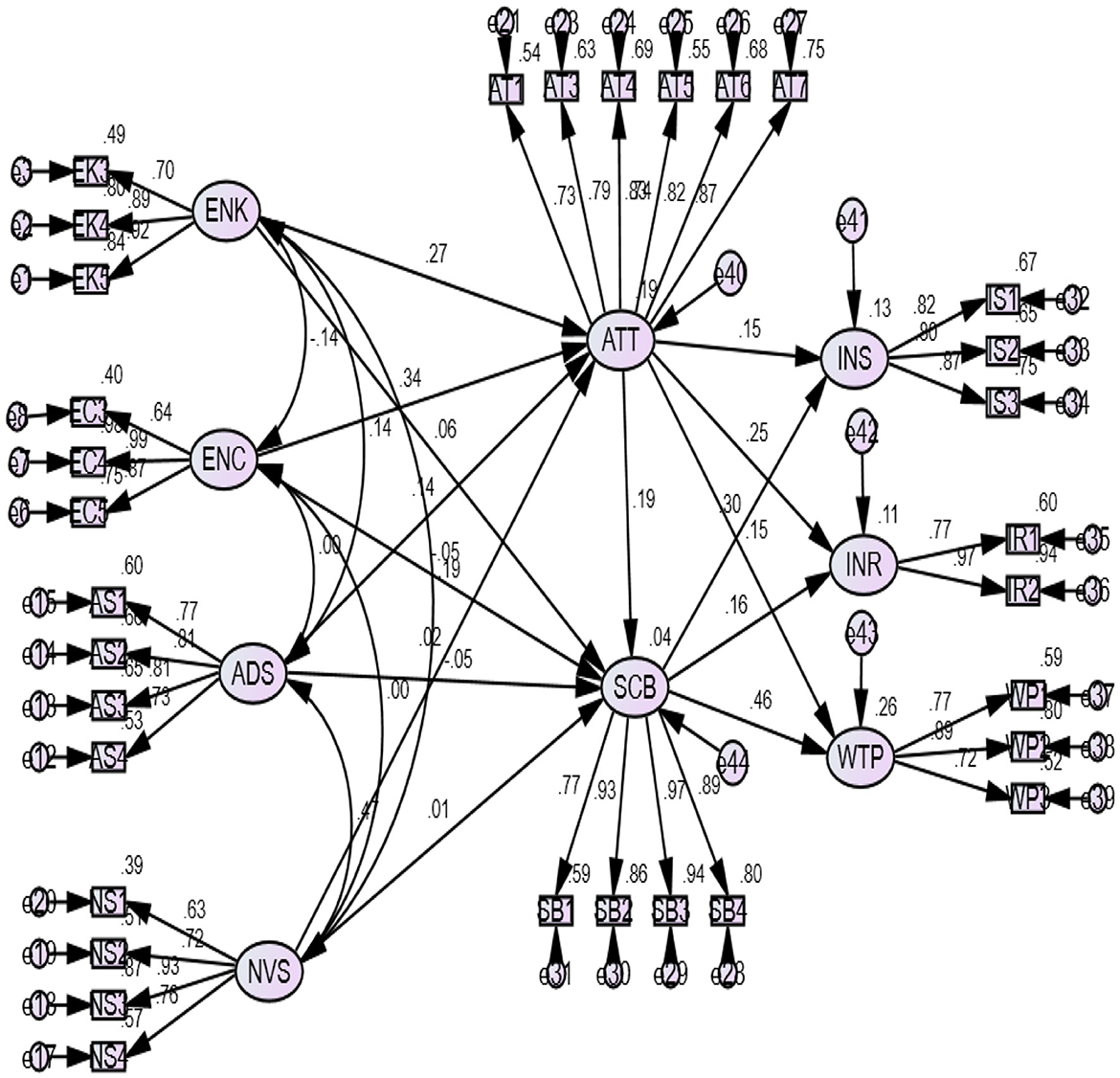- 1Marketing and Analytics, Hult International Business School, San Francisco, CA, United States
- 2Marketing, ICFAI Business School, Hyderabad, India
Introduction: This research paper explores the increasing significance of sustainability within the hospitality industry, focusing on how customers' patronage intentions are influenced by green hotels. Amid rising global awareness of environmental issues, the study investigates the effect of hotels' green initiatives on customer behavior and decision-making. The analysis employs theories such as the Theory of Reasoned Action (TRA) and the Theory of Planned Behavior (TPB) to examine the roles of environmental awareness, personal norms, and perceived behavioral control in shaping consumer choices at green hotels.
Method: The methodology involves a detailed survey of 418 travelers in India, evaluating their attitudes toward green hotels and how these attitudes impact their sustainable consumption behaviors. The survey aimed to gather data on participants' environmental awareness, personal norms, perceived behavioral control, and their intentions to support green hotels. Statistical analysis was used to interpret the survey responses and to identify significant trends and correlations.
Results: Findings from 397 valid responses indicate that well-informed consumers are more likely to support and prefer hotels committed to sustainability, positively affecting their purchasing decisions and loyalty. The data showed a strong correlation between environmental awareness and patronage intentions, with personal norms and perceived behavioral control also playing significant roles in consumer choices.
Discussion: The research enhances understanding of consumer behavior in sustainable tourism, providing important insights for hotel managers and policymakers. It underscores the importance of incorporating green practices into business strategies to appeal to environmentally conscious customers and emphasizes the need for continuous engagement and transparency in promoting environmental values. These practices are crucial for boosting customer satisfaction and loyalty in the hospitality industry. By aligning business operations with sustainable practices, hotels can not only attract more environmentally aware customers but also contribute positively to broader environmental goals.
Introduction
This research paper investigates the increasing importance of sustainability in the hospitality industry, specifically focusing on customer intentions to patronize green hotels. Amidst growing global environmental awareness, the study explores how green initiatives within hotels influence customer behavior and decision-making. Employing theories like the Theory of Reasoned Action (TRA) and the Theory of Planned Behavior (TPB), it assesses the effects of environmental awareness, personal norms, and perceived behavioral control on consumer choices in the context of green hotels.
The methodology comprises an extensive survey of 418 travelers in India, evaluating their attitudes toward green hotels and the impact of these attitudes on their sustainable consumption behaviors. Findings from 397 valid responses indicate that well-informed consumers are more likely to support and prefer hotels committed to sustainability, which positively influences their purchasing decisions and loyalty.
This study enriches the theoretical and practical understanding of consumer behavior in sustainable tourism, offering valuable insights for hotel managers and policymakers about the importance of integrating green practices into business strategies to attract environmentally conscious customers. It emphasizes the need for continued engagement and transparency in promoting environmental values, which can significantly enhance customer satisfaction and loyalty in the hospitality sector.
In an era marked by climate change threats to global stability, environmental, social, and governance (ESG) issues have become pivotal in investment and organizational priorities. Notable investors like Blackstone Vista and leading tech companies such as Genesys, PagerDuty, and Robinhood are increasingly adopting sustainable practices. This growing focus is reflected in stringent regulations like those proposed by the US Securities and Exchange Commission (SEC), which from 2024 will require detailed climate-related disclosures in financial statements, signaling a broader and irreversible shift toward sustainability reshaping industries, especially tourism and hospitality.
This research delves into the crucial role of the hospitality sector in promoting sustainable development through green hotels, exploring how these establishments are responding to environmental challenges and influencing consumer preferences toward sustainability. The integration of green practices within hotels significantly impacts customer patronage intentions, offering a clear competitive advantage for environmentally conscious businesses.
Furthermore, the adoption of the United Nations' “Green Economy policies” in 2012 has heightened the urgency for industries to adopt sustainable practices. This paper aims to enrich existing literature by providing a thorough analysis of the impact of hotel investments in green initiatives on consumer behavior. It examines the expected value of such investments, strategies to enhance purchase intentions through sustainability, and a model for ongoing engagement in the hospitality industry.
By leveraging theories like the TRA and TPB, this study extends our understanding of how environmental awareness and personal norms influence consumer decisions in the context of green hotels. It suggests that well-informed consumers are likely to have a positive attitude toward hotels that prioritize sustainability, thereby influencing their purchasing decisions.
This research not only underscores the importance of integrating sustainable practices into business strategies but also offers valuable insights for policymakers, investors, and business leaders aiming to foster a sustainable development environment. Through its findings, the study contributes to the theoretical and practical knowledge base, supporting a transition toward more sustainable business practices in the hospitality industry.
Regulators worldwide are also proposing new disclosure requirements for businesses in response to emerging climate risks to the economy. The US Securities and Exchange Commission (SEC) recently proposed rule changes requiring registrants to include specific climate-related disclosures in their registration statements and periodic reports starting in 2024. This growing investor and regulatory interest in climate change effects underscores the prioritization of sustainability in corporate strategies. Companies are actively preparing for upcoming regulatory requirements by declaring their sustainability goals and seeking opportunities to reduce their environmental impact. To meet their environmental sustainability objectives, the tourism and hospitality industries must collaborate closely with customers.
This paper builds on the Theory of Consumption Value (TCV) by Sheth et al. (1991), providing a framework for understanding consumer purchasing decisions and contributing valuable insights to both practice and theory.
Materials and methods
Theoretical framework
Marketers are adopting sustainable measures in response to the growing consumer awareness of environmental changes. Numerous theories have been explored to understand the complex factors that influence decision-making. In the context of green lodging, terms like “green,” “sustainable,” “eco-friendly,” and “environmentally responsible” are often used interchangeably. The Theory of Reasoned Action (TRA) and the Theory of Planned Behavior (TPB) are commonly applied to expand our understanding of these influences. According to TRA, individuals are likely to engage in behaviors that lead to desired outcomes, carefully considering the consequences of alternative actions before making a decision. TPB, an extension of TRA proposed by Ajzen (1991), suggests that choices are influenced by volitional factors.
TPB is widely used in the hospitality industry to predict behaviors related to food waste management, energy conservation, and customer loyalty toward green practices. This theory suggests that attitudes, subjective norms, and perceived behavioral control are key factors shaping such behaviors. Combining TPB with models like the Norm Activation Model (NAM) and Green Corporate Social Responsibility (GCSR) provides deeper insights into how these theories collectively influence environmentally friendly behaviors in the hospitality sector.
This study also incorporates the Theory of Consumption Value (TCV) to frame its hypotheses. TCV predicts consumer behavior by anticipating, describing, and justifying choices. It addresses why consumers prefer certain brands, types, or products over others by evaluating how well consumer needs are met by the overall utility derived from a product post-purchase. In the hospitality industry, the theory of consumption value highlights various factors that influence consumer decision-making and behavior, such as aesthetics and escapism, which affect satisfaction and loyalty. Additionally, it examines how segmentation in loyalty programs and the food consumption value model can be employed to effectively target and meet customer needs, particularly in balancing sustainability concerns with product attributes and emotional and geographical values.
Ultimately, TCV is a robust framework that has been extensively used in research on consumer decision-making behavior concerning green hotels, smartphones, and food delivery apps. This model accounts for all aspects of consumer behavior, including subjective factors, cost-benefit tradeoffs, and overall consumption experience, offering a comprehensive approach to understanding consumer choices in the hospitality sector.
The Theory of Consumption Value (TCV) advocates an integrated approach to understanding consumer behavior, examining various consumption values like value for money, social value, conditional value, and epistemic value. According to TCV, the extent to which a product meets a consumer's needs is determined by a thorough assessment of the product's overall utility or satisfaction, weighing its pros and cons (Moshood et al., 2022). When the perceived value of a green alternative surpasses other options, consumers, acting as value enhancers, tend to prefer it over traditional products. This study incorporates hedonic motivations (such as adventurous spirit and novelty-seeking) and environmental motivations (such as environmental concern and knowledge) to explain the increase in consumer patronage intentions and the perceived value of consuming green products. Figure 1 represents proposed theoretical model of the study.
Environmental knowledge
Environmental knowledge entails active engagement with environmental issues (Stern et al., 1995). Research shows that poor environmental conditions significantly obstruct green consumption (Simmons and Widmar, 1990; Schultz and Zelezny, 1999). Individuals well-informed about environmental issues generally display a more positive attitude toward the environment and are more likely to adopt sustainable consumption habits (Hines et al., 1987; Barlés-Arizón et al., 2008; Marquart-Pyatt, 2008; Macias et al., 2015). The process of effectively transmitting and delivering information is crucial in achieving this level of expertise, with strategies aimed at increasing environmental knowledge proving effective in promoting sustainable behavior.
H1a/1b: Environmental knowledge influences attitude and sustainable consumption behavior
Environmental concern
Numerous studies focus on environmental concerns, characterized by a general value orientation toward the natural world, concern about the environment's future, and the effects of human progress on the environment (Vainio and Paloniemi, 2014). Franzen and Meyer (2010) define environmental concern as awareness of environmental threats due to pollution or resource overuse, which is linked to environmentally responsible behavior and attitudes toward sustainable consumption, such as opting for public transport. Past research indicates that heightened environmental concern positively influences sustainable consumption behavior (Minton and Rose, 1997; Roberts and Bacon, 1997; Park and Lee, 2014).
H2a/2b: Environmental concern influences attitude and sustainable consumption behavior
Adventurous spirit
Research has linked several values with ecological consciousness, including adherence, self-direction, universalism, emotional well-being, and security. An adventurous life, often associated with the pursuit of stimulation and self-improvement, aligns with these values. A factor analysis identified four key factors—adventurous spirit, leadership spirit, communication, and enlightenment—that are important for individuals seeking new and exciting experiences. Notably, adventurous spirit is significantly correlated with environmentally friendly behavior, emphasizing the importance of merging hedonistic motives with environmentally responsible purchases. Consumers may desire green products due to their lesser environmental impact and unique features, differentiating them from conventional products.
H3a/3b: Adventurous spirit influences attitude and sustainable consumption behavior
Novelty seeking
Travelers naturally desire novelty, recognized as a significant attribute in tourist decision-making (Cohen, 1979; Petrick, 2002). The Variety Seeking Theory (McAlister, 1982) and the Novelty Seeking Theory (Jang and Feng, 2004) propose that consumers seek optimal stimulation levels in their behaviors. These theories are pivotal for analyzing travel destination choices, indicating that novelty seeking drives travel motivation and affects decision-making (Petrick, 2002; Jang and Feng, 2004; Toyama and Yamada, 2012; Assaker and Hallak, 2013).
H4a/4b: Novelty seeking influences attitude and sustainable consumption behavior.
H5: Attitude influences sustainable consumption behavior.
Patronage intentions
According to the United Nations World Tourism Organization (2008), the hotel industry significantly impacts the environment due to its high levels of energy and water consumption, waste generation, and CO2 emissions. Leading hotel brands globally have increased their efforts to address these environmental issues, investing heavily in green practices in recent years (Kasim, 2006; Kim et al., 2013; Tang and Lam, 2017; Mbasera et al., 2018; Teng et al., 2018). Several studies have examined how eco-friendly practices influence customer loyalty, the intention to return, and the likelihood of recommending the hotel (Dutta et al., 2008; Kang et al., 2012; Hu et al., 2016).
This essay explores how customers' sustainable behaviors and attitudes toward hotels' green practices affect their decisions to stay at green hotels. It further investigates customer intentions to make green purchases, focusing on two additional constructs. One crucial construct is the recommendations from past or current visitors, which significantly impact green patronage intentions (Suki and Suki, 2015; Filimonau et al., 2022). Research highlights the positive effect of travelers' willingness to recommend a hotel to others (Lee et al., 2010; Han and Han, 2018; Wang et al., 2021).
The propensity of customers to pay more to support ethical company behaviors is also examined. A 1997 study by Creyer and Roass, based on survey responses from 280 customers, along with a 1993 study by Roper Starch Worldwide and Cone/Coughlin Communications, found that 51% of surveyed customers were willing to pay more for products or services linked to causes they care about. Furthermore, a 1995 study by Simon revealed that 85% of 2,000 U.S. customers had positive attitudes toward companies engaged in significant causes. This study, therefore, analyzes customer willingness to pay more as part of its examination of green patronage.
H6a/6b/6c: Attitude toward green hotels influences intentions to stay in green hotel, intentions to recommend a green hotel and willingness to pay for a green hotel
H7a/7b/c: Sustainable consumption behavior influences intentions to stay in green hotel, intentions to recommend a green hotel and willingness to pay for a green hotel
Results
Research methodology
India's hospitality sector has experienced steady growth over the past few years and shows significant potential for future expansion. Attracting numerous travelers globally, India is celebrated for its diverse and rich culture, making it a favored destination for both spiritual vacations and cultural explorations (Claveria and Poluzzi, 2016). The country has consistently improved its position on the World Economic Forum's travel and tourism competitiveness index, maintaining its status as a top performer in South Asia.
Key drivers of this growth include the expanding middle class, increasing discretionary incomes, and a growing interest in domestic travel among millennials. These factors have significantly contributed to the success of the domestic travel industry. The hotel and tourism sector alone has contributed 7.5% to the GDP, demonstrating robust expansion.
This study aimed to gather data from travelers in India who stayed in hotels during 2023. From August 21 to November 27, 2023, a research questionnaire was distributed in English through electronic data collection forms on Office 365. We received 407 valid responses; details of the respondents' profiles are provided in Table 1.
Measurement scale development
For the present study, a cross-sectional survey was adopted. Utilizing statements from the relevant literature for the present study constructs, the research instrument was developed (see Table 2).
The structured questionnaire also had seven demographic questions. On a seven-point Likert's scale, respondents were asked to indicate whether they agreed or disagreed with each of the stated propositions (where 1 = strongly disagree; 7 = strongly agree). During the survey response process, debriefing was done to address the respondents' queries.
Table 3 presents the data for the variables in the study, including their averages and standard deviations. The standard deviations ranged from 0.636 to 1.403, while the average values varied from 4.86 to 6.43. Additionally, we calculated Cronbach's alpha values to assess the reliability of the construct items, with alpha values ranging from 0.831 to 0.937 and an overall alpha of 0.867. According to Nunnally and Bernstein (1994), reliability is confirmed as alpha values above 0.60 meet the test criteria.
Before proceeding with the final data analysis, we conducted a normality test to verify that the data met the basic assumption of normality. The analysis revealed skewness between −1.645 and −0.112, and kurtosis values from −0.571 to 4.234. Using the ranges (±2) and (±5) indicated that the data satisfied the assumption of normality (West et al., 1995).
Common method bias
According to Spector (2019), correlations in cross-sectional research may deviate due to common method variance, potentially impacting the validity of empirical findings. This variance can affect evaluations of scale reliability and convergent validity, leading to overstatements in research model coefficients (Podsakoff et al., 2012). Managing response bias in such studies is challenging, making it impractical to let it undermine the legitimacy of the results. We utilized Harman's (1976) single factor test to assess the presence of common method bias, noting that no single component should explain more than 50% of the variance. Our results showed that one component accounted for 18.927% of the variance, well below the threshold, indicating no significant issues with common method bias.
Measurement model
The constructs for this study were measured using scales from prior research in sustainable tourism development. To confirm the factor structure's validity, we performed Confirmatory Factor Analysis (CFA) using IBM AMOS 21.0.
According to the CFA results, all of the research variables had significant factor loadings. Thus, the apriori factor structure was created.
It is evident from the Table 4 that the criteria suggested by Hu and Bentler (1999) have met clearly. Hence, measurement model is supported.
Convergent and discriminant validity
The convergent validity and discriminant validity of a scale were evaluated in order to determine its construct validity, as indicated by Campbell and Fiske (1959).
Convergent and discriminant validity tests were conducted to confirm construct validity. All study constructs must exhibit CR values more than 0.70 and AVE values higher than 0.50 (Fornell and Larcker, 1981; Bagozzi and Yi, 1988). These threshold criteria were met clearly in this study. Further, the discriminant validity was estimated following the criteria given by Fornell and Larcker (1981) and Hair et al. (2019). According to these criteria, AVE value must be higher than the correlation coefficients between the two underlying constructs. The results of the study confirmed the above-mentioned criteria for ascertaining discriminant validity. Please refer to Table 5 for convergent and discriminant validity results.
Hypotheses testing
Table 6 outlines the results from the structural model analysis. The results clearly show that environmental concern (β = 0.336, p < 0.000) is the most significant predictor of individuals' attitudes, followed by environmental knowledge (β = 0.271, p < 0.000), and adventurous spirit (β = 0.135, p = 0.025). Novelty seeking did not significantly affect attitude (β = 0.017, p = 0.778). Together, environmental knowledge, environmental concern, adventurous spirit, and novelty seeking explained 19.40 percent of the variance in attitude.
The empirical results of this study support the positive and significant impact of attitude on sustainable consumption behavior (β = 0.190, p < 0.001). However, environmental knowledge, environmental concern, adventurous spirit, and novelty seeking did not significantly influence sustainable consumption behavior, with these factors together explaining only 4.00 percent of the variance in this behavior.
The study also found that sustainable consumption behavior (β = 0.461, p < 0.000) is the most critical predictor of individuals' willingness to pay a premium for a green hotel, followed by attitude (β = 0.154, p = 0.003). These two predictors accounted for 26.20 percent of the variance in willingness to pay a premium.
Moreover, sustainable consumption behavior (β = 0.254, p < 0.000) was identified as the most significant predictor of individuals' intention to recommend a green hotel, followed by attitude (β = 0.163, p = 0.003). Together, these factors explained 10.60 percent of the variance in the intention to recommend.
Furthermore, the results confirmed that attitude (β = 0.300, p < 0.000) is the most crucial predictor of individuals' intention to stay in a green hotel, followed by sustainable consumption behavior (β = 0.148, p = 0.006). These predictors explained 12.80 percent of the variance in the intention to stay.
Mediation analysis
The study also examined the mediating roles of individuals' attitudes and sustainable consumption behavior in influencing various outcomes.
Table 7 clearly demonstrates that individuals' attitudes did not significantly mediate the relationship between novelty seeking and sustainable consumption behavior. However, sustainable consumption behavior did partially mediate three key relationships: individuals' attitude and their willingness to pay a premium for a green hotel, their intention to recommend a green hotel, and their intention to stay in a green hotel.
The study also found a full mediating effect of individuals' attitudes on the relationships between environmental knowledge and sustainable consumption behavior, environmental concern and sustainable consumption behavior, and adventurous spirit and sustainable consumption behavior. Figures 2, 3 represent measurement model and structural model of the study.
Discussion
The results indicate that environmental concern, environmental knowledge, and adventurous spirit are the most significant predictors of individuals' attitudes. Novelty seeking, however, did not significantly affect attitudes. Collectively, environmental awareness, care for the environment, the spirit of adventure, and interest in novelty explained 19.40 percent of the variance in attitudes.
Empirical findings from this study show that attitude significantly and positively impacts sustainable consumption behavior. Yet, environmental awareness, concern for the environment, a sense of adventure, and a desire for novelty did not significantly influence sustainable consumption patterns. These five predictors together explained only 4 percent of the variance in sustainable consumption behavior.
Regarding financial commitment, the study shows that sustainable consumption behavior, followed by attitude, strongly influences individuals' willingness to pay more for a green hotel, accounting for 26.20 percent of the variance.
Furthermore, sustainable consumption behavior and attitude were the strongest predictors of individuals' intentions to recommend a green hotel, explaining 10.60 percent of the variance.
Lastly, the study confirmed that attitude is the most critical predictor of individuals' intentions to stay in a green hotel, followed by sustainable consumption behavior, which together accounted for 12.80 percent of the variance in these intentions.
Implications of the study
This research on the patronage intentions of customers toward green hotels has significant implications in theoretical, practical, and policy contexts. By integrating insights from the Theory of Consumption Value (TCV) and environmental psychology, the study enhances our understanding of consumer behavior in sustainable tourism.
Theoretical contributions:
• Extension of TCV: The study extends the Theory of Consumption Value by incorporating environmental knowledge and concern as factors influencing consumer decisions. It reveals that the perceived value of green practices in hotels significantly impacts customer decisions, offering a more nuanced view of consumer value assessment in the hospitality sector.
• Enrichment of Traditional Models: It enriches traditional models like the Theory of Reasoned Action (TRA) and the Theory of Planned Behavior (TPB) by showing that environmental concern and knowledge directly influence consumer attitudes and behaviors toward green hotels. The study underscores that pro-environmental behavior can be better understood by considering ecological motives alongside traditional behavioral predictors.
• Green Consumerism: This research adds to the literature on green consumerism by empirically testing and validating the impact of various motivational drivers (e.g., adventurous spirit, novelty-seeking) on the preference for green hotels. It highlights the complex interplay of hedonic and altruistic motives in shaping sustainable consumption behaviors.
Practical implications:
• Marketing Strategy: For practitioners in the hospitality industry, the findings emphasize the importance of promoting the environmental attributes of their services. Hotels that invest in green technologies and practices can use these as key marketing points to attract environmentally conscious consumers.
• Consumer Engagement: Increasing consumer knowledge about environmental issues and the specific ecological efforts of hotels can enhance customer patronage. Educational campaigns and transparent communication about sustainable practices should be integral to customer engagement strategies.
• Innovation in Services: Hotel managers are encouraged to innovate by integrating sustainability into their service offerings. Developing new green products, such as eco-friendly spa services or sustainable gastronomy, can cater to the growing segment of consumers interested in environmental quality as part of their travel experience.
Policy implications:
• Regulatory Framework: Policymakers can use these insights to frame regulations that encourage hotels to adopt green practices. Incentives like tax breaks, subsidies, or certifications for green hotels can motivate businesses to invest in sustainable technologies and practices.
• Educational Programs: The significant role of environmental knowledge in shaping consumer behaviors suggests that governments and NGOs should prioritize educational programs that raise awareness about sustainability issues in tourism. These programs can help cultivate a culture of environmental responsibility among consumers and businesses alike.
• Standardized Reporting: With growing consumer interest in corporate sustainability efforts, there is a need for standardized reporting and disclosure of environmental impacts in the tourism sector. Such policies can help consumers make more informed choices and foster a competitive environment that encourages more hotels to engage in sustainable practices.
The study not only contributes to the academic discourse on sustainable consumer behavior in tourism but also provides actionable insights for industry leaders and policymakers aiming to promote sustainability in the hospitality sector. The shift toward green hotels aligns with environmental goals and resonates strongly with consumer preferences, supporting the long-term viability and success of the hospitality industry.
Limitations and recommendations for future research
Customer patronage intention is influenced by their perception of sustainable practices. The structural equation model in this study examined how factors such as environmental awareness, environmental concerns, hedonic motivators (adventurous spirit and novelty seeking), and individual attitudes impact sustainable consumption behavior, which in turn affects patronage intentions. The study's hypotheses, reflecting the causal relationships of each indicator scientifically and logically, are supported by the model's good fit, as demonstrated by its performance. This research addresses gaps left by previous studies on sustainable tourism and consumer goals.
To further support and expand these findings, additional research is needed. First, data-selection issues, common in empirical studies based on individual survey data, may arise from using cross-sectional data. Therefore, future studies could verify these results using panel data or causality studies. Second, the research should be extended to different geographical locations since this study only focused on travelers from India. Finally, qualitative research could be employed in future studies to explore other, untested variables.
Data availability statement
The raw data supporting the conclusions of this article will be made available by the authors, without undue reservation.
Ethics statement
The studies involving humans were approved by Hult International Business School. The studies were conducted in accordance with the local legislation and institutional requirements. The participants provided their written informed consent to participate in this study. Written informed consent was obtained from the individual(s) for the publication of any potentially identifiable images or data included in this article.
Author contributions
PS: Conceptualization, Data curation, Formal analysis, Methodology, Project administration, Resources, Validation, Writing – original draft, Writing – review & editing. VG: Writing – review & editing.
Funding
The author(s) declare that no financial support was received for the research, authorship, and/or publication of this article.
Conflict of interest
The authors declare that the research was conducted in the absence of any commercial or financial relationships that could be construed as a potential conflict of interest.
Publisher's note
All claims expressed in this article are solely those of the authors and do not necessarily represent those of their affiliated organizations, or those of the publisher, the editors and the reviewers. Any product that may be evaluated in this article, or claim that may be made by its manufacturer, is not guaranteed or endorsed by the publisher.
References
Ajzen, I. (1991). The theory of planned behavior. Organ. Behav. Hum. Decis. Process. 50, 179–211 doi: 10.1016/0749-5978(91)90020-T
Araujo, R. B., Rodrigues, G. L., Dos Santos, E. C., and Pettersson, L. G. (2022). Adsorption energies on transition metal surfaces: towards an accurate and balanced description. Nature Commun. 13:6853. doi: 10.1038/s41467-022-34507-y
Assaker, G., and Hallak, R. (2013). Moderating effects of tourists' novelty-seeking tendencies on destination image, visitor satisfaction, and short-and long-term revisit intentions. J. Travel Res. 52, 600–613. doi: 10.1177/0047287513478497
Bagozzi, R. P., and Yi, Y. (1988). On the evaluation of structural equation models. J. Acad. Mark. Sci. Rev 16, 74–94. doi: 10.1007/BF02723327
Barlés-Arizón, M. J., Fraj-Andrés, E., and Martínez-Salinas, E. (2008). What is the Partners Role in the Family Decision-Making?: The Use of Different Disuassive Tactics. Rome: IAREP/SABE World Meeting.
Campbell, D. T., and Fiske, D. W. (1959). Convergent and discriminant validation by the multitrait-multimethod matrix. Psychol. Bull. 56, 81–105. doi: 10.1037/h0046016
Chan, R. Y., and Lau, L. B. (2000). Antecedents of green purchases: a survey in China. J. Consum. Market. 17, 338–357. doi: 10.1108/07363760010335358
Chen, M. F., and Tung, P. J. (2014). Developing an extended Theory of Planned Behavior model to predict consumers, intention to visit green hotels. Int. J. Hosp. Manage.36, 221–230. doi: 10.1016/j.ijhm.2013.09.006
Claveria, O., and Poluzzi, A. (2016). Tourism trends in the world's main destinations before and after the 2008 financial crisis using UNWTO official data. Data Brief 7, 1063–1069. doi: 10.1016/j.dib.2016.03.043
Cohen, E. (1979). Rethinking the sociology of tourism. Ann. Tour. Res. 6, 18–35. doi: 10.1016/0160-7383(79)90092-6
Dutta, K., Umashankar, V., Choi, G., and Parsa, H. G. (2008). A comparative study of consumers' green practice orientation in India and the United States: a study from the restaurant industry. J. Foodservice Bus. Res. 11, 269–285. doi: 10.1080/15378020802316570
Filimonau, V., Matute, J., Mika, M., Kubal-Czerwińska, M., Krzesiwo, K., and Pawłowska-Legwand, A. (2022). Predictors of patronage intentions towards ‘green' hotels in an emerging tourism market. Int. J. Hosp. Manage. 103:103221. doi: 10.1016/j.ijhm.2022.103221
Fornell, C., and Larcker, D. F. (1981). Evaluating structural equation models with unobservable variables and measurement error. J. Market. Res. 18, 39–50. doi: 10.1177/002224378101800104
Franzen, A., and Meyer, R. (2010). Environmental attitudes in cross-national perspective: a multilevel analysis of the ISSP 1993 and 2000. Eur. Sociol. Rev. 26, 219–234. doi: 10.1093/esr/jcp018
Grilli, G., and Curtis, J. (2021). Encouraging pro-environmental behaviours: a review of methods and approaches. Renew. Sustain. Energy Rev. 135, 110039. doi: 10.1016/j.rser.2020.110039
Hair, J. F., Risher, J. J., Sarstedt, M., and Ringle, C. M. (2019). When to use and how to report the results of PLS-SEM. Eur. Busin. Rev. 31, 2–24. doi: 10.1108/EBR-11-2018-0203
Han, S., and Han, H. (2018). Role of perceived fit with hotels' green practices in the formation of customer loyalty: Impact of environmental concerns. Asia Pac. J. Tour. Res. 18, 1–18. doi: 10.1080/10941665.2012.695291
Hines, J. M., Hungerford, H. R., and Tomera, A. N. (1987). Analysis and synthesis of research on responsible environmental behavior: a meta-analysis. J. Environm. Educ. 18, 1–8. doi: 10.1080/00958964.1987.9943482
Hu, L. T., and Bentler, P. M. (1999). Cutoff criteria for fit indexes in covariance structure analysis: Conventional criteria versus new alternatives. Struct. Equat. Model. 6, 1–55. doi: 10.1080/10705519909540118
Hu, P. J. H., Hu, H. F., Wei, C. P., and Hsu, P. F. (2016). Examining firms' green information technology practices: a hierarchical view of key drivers and their effects. J. Manage. Inform. Syst. 33, 1149–1179. doi: 10.1080/07421222.2016.1267532
Jang, S. S., and Feng, R. (2004). Temporal destination revisit intention: the effects of novelty seeking and satisfaction. Tour. Manage. 28, 580–590. doi: 10.1016/j.tourman.2006.04.024
Kang, K. H., Stein, L., Heo, C. Y., and Lee, S. (2012). Consumers' willingness to pay for green initiatives of the hotel industry. Int. J. Hosp. Manage. 31, 564–572. doi: 10.1016/j.ijhm.2011.08.001
Kasim, A. (2006). The need for business environmental and social responsibility in the tourism industry. Int. J. Hosp. Tour. Admin. 7, 1–22. doi: 10.1300/J149v07n01_01
Kim, E., Ham, S., Yang, S., and Chal, J. G. (2013). The roles of attitude, subjective norm, and perceived behavioral control in the formation of consumers' behavioral intentions to read menu labels in the restaurant industry. Int. J. Hosp. Manag. 35, 203–213 doi: 10.1016/j.ijhm.2013.06.008
Lee, J. S., Hsu, L. T., Han, H., and Kim, Y. (2010). Understanding how consumers view green hotels: how a hotel's green image can influence behavioural intentions. J. Sustain. Tour. 18, 901–914. doi: 10.1080/0966958100377774
Macias, C., Gold, P. B., Öngür, D., Cohen, B. M., and Panch, T. (2015). Are single-item global ratings useful for assessing health status? J. Clini. Psychol. Med. settings 22, 251–264. doi: 10.1007/s10880-015-9436-5
Manning, K. C., Bearden, W. O., and Madden, T. J. (1995). Consumer innovativeness and the adoption process. J. Consum. Psychol. 4, 329–345. doi: 10.1207/s15327663jcp0404_02
Marquart-Pyatt, S. T. (2008). Are there similar sources of environmental concern? Comp. Industrial. Count. Soc. Sci Quart. 89, 1312–1335. doi: 10.1111/j.1540-6237.2008.00567.x
Mbasera, M., du Plessis, E., Saayman, M., and Kruger, M. (2018). Determining the impact of green management policies on hotel performance: a manager's perspective. Afr. J. Hosp. Tour. Leisure 7, 1–13.
McAlister, L. (1982). A dynamic attribute satiation model of variety-seeking behavior. J. Consum. Res. 9, 141–150. doi: 10.1086/208907
Minton, A. P., and Rose, R. L. (1997). The effects of environmental concern on environmentally friendly consumer behavior: an exploratory study. J. Busin. Res. 40, 37–48. doi: 10.1016/S0148-2963(96)00209-3
Moshood, T. D., Nawanir, G., Mahmud, F., Mohamad, F., Ahmad, M. H., and AbdulGhani, A. (2022). Sustainability of biodegradable plastics: New problem or solution to solve the global plastic pollution? Curr. Res. Green Sustain. Chem. 5:100273. doi: 10.1016/j.crgsc.2022.100273
Nunnally, J. C., and Bernstein, I.H. (1994). The assessment of reliability. Psychom. Theor. 3, 248–292.
Park, J. S., and Lee, J. (2014). Segmenting green consumers in the United States: implications for green marketing. J. Promot. Manage. 20, 571–589. doi: 10.1080/10496491.2014.946202
Petrick, J. F. (2002). Development of a multi-dimensional scale for measuring the perceived value of a service. J. Leisure Res. 34, 119–134. doi: 10.1080/00222216.2002.11949965
Podsakoff, P. M., MacKenzie, S. B., and Podsakoff, N. P. (2012). Sources of method bias in social science research and recommendations on how to control it. Annual Rev. Psychol. 63, 539–569. doi: 10.1146/annurev-psych-120710-100452
Roberts, J. A., and Bacon, D. R. (1997). Exploring the subtle relationships between environmental concern and ecologically conscious consumer behavior. J. Busin. Res. 40, 79–89. doi: 10.1016/S0148-2963(96)00280-9
Schultz, P. W., and Zelezny, L. (1999). Values as predictors of environmental attitudes: evidence for consistency across 14 countries. J. Environm. Psychol. 19, 255–265. doi: 10.1006/jevp.1999.0129
Sheth, J. N., Newman, B. I., and Gross, B. L. (1991). Why we buy what we buy: a theory of consumption values. J. Busin. Res. 22:8. doi: 10.1016/0148-2963(91)90050-8
Simmons, D., and Widmar, R. (1990). Motivations and barriers to recycling: toward a strategy for public education. J. Environ. Educ. 22, 13–18. doi: 10.1080/00958964.1990.9943041
Spector, P. E. (2019). Do not cross me: optimizing the use of cross-sectional designs. J. Busin. psychol. 34, 125–137. doi: 10.1007/s10869-018-09613-8
Stern, P. C., Kalof, L., Dietz, T., and Guagnano, G. A. (1995). Values, beliefs, and proenvironmental action: attitude formation toward emergent attitude objects 1. J. Appl. Social Psychol. 25, 1611–1636. doi: 10.1111/j.1559-1816.1995.tb02636.x
Suki, N., and Suki, N. (2015). Consumption values and consumer environmental concern regarding green products. Int. J. Sustain. Dev. World Ecol. 22, 269–278. doi: 10.1080/13504509.2015.1013074
Tang, C. M. F., and Lam, D. (2017). The role of extraversion and agreeableness traits on Gen Y's attitudes and willingness to pay for green hotels. Int. J. Contemp. Hosp. Manage. 29, 607–623. doi: 10.1108/IJCHM-02-2016-0048
Teng, C. C., Lu, A. C. C., and Huang, T. T. (2018). Drivers of consumers' behavioral intention toward green hotels. Int. J. Contemp. Hosp. Manage. 30, 1134–1151. doi: 10.1108/IJCHM-04-2017-0203
Toyama, M., and Yamada, Y. (2012). The relationships among tourist novelty, familiarity, satisfaction, and destination loyalty: beyond the novelty-familiarity continuum. Int. J. Market. Stud. 4:10. doi: 10.5539/ijms.v4n6p10
Vainio, A., and Paloniemi, R. (2014). The complex role of attitudes toward science in pro-environmental consumption in the Nordic countries. Ecol. Econ. 108, 18–27. doi: 10.1016/j.ecolecon.2014.09.026
Wang, Q., X.in, K., L.iu, X., Shen, G., Wei, H., and Liu, T. Y. (2021). Psychological drivers of hotel guests' energy-saving behaviours—empirical research based on the extended theory of planned behaviour. Buildings 11:401. doi: 10.3390/buildings11090401
West, S. G., Finch, J. F., and Curran, P. J. (1995). Structural Equation Models with Nonnormal Variables: Problems and Remedies.
Keywords: patronage intention, sustainable consumption behavior, green hotels, environmental knowledge, environmental concerns
Citation: Shrivastava P and Gautam V (2024) Examining patronage intentions of customers: a case of green hotels. Front. Sustain. Tour. 3:1429472. doi: 10.3389/frsut.2024.1429472
Received: 08 May 2024; Accepted: 15 July 2024;
Published: 21 August 2024.
Edited by:
Masood Khodadadi, University of the West of Scotland, United KingdomReviewed by:
Tamara Gajić, Serbian Academy of Sciences and Arts, SerbiaClaudia Cozzio, Free University of Bozen-Bolzano, Italy
Copyright © 2024 Shrivastava and Gautam. This is an open-access article distributed under the terms of the Creative Commons Attribution License (CC BY). The use, distribution or reproduction in other forums is permitted, provided the original author(s) and the copyright owner(s) are credited and that the original publication in this journal is cited, in accordance with accepted academic practice. No use, distribution or reproduction is permitted which does not comply with these terms.
*Correspondence: Priyanka Shrivastava, UHJpeWFua2Euc2hyaXZhc3RhdmFAZmFjdWx0eS5odWx0LmVkdQ==
 Priyanka Shrivastava
Priyanka Shrivastava Vikas Gautam2
Vikas Gautam2